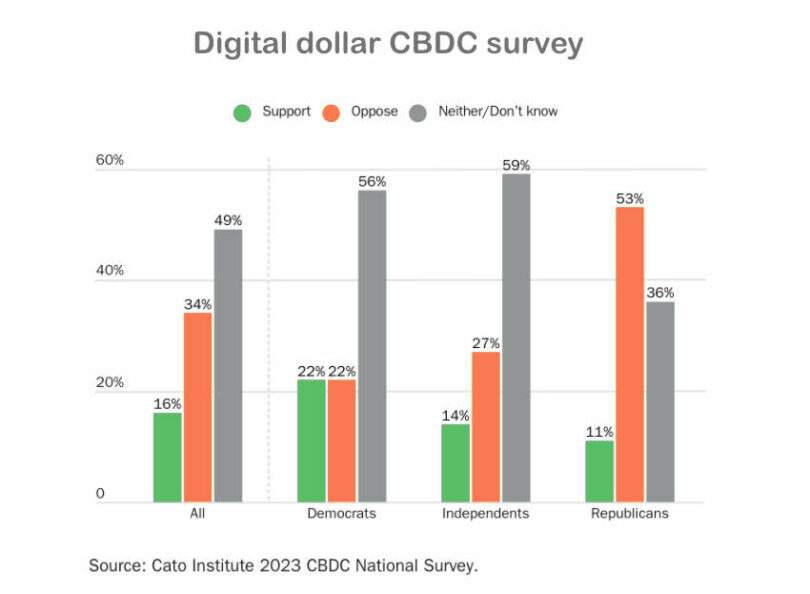A recent poll by YouGov and the Cato Institute found that 34% of Americans oppose the issuance of a central bank digital currency (CBDC), compared to 16% who favor it. Fears of government control, elimination of cash, and cyberattacks continue to weigh on people’s views of a digital dollar, especially among U.S. Republicans. Trust in the Federal Reserve (Fed) and familiarity with CBDCs were the most heavily correlated with support.
Digital dollar skepticism
The survey found that twice as many Americans oppose the idea of a federally controlled digital dollar as those who support it. However, most people (49%) have yet to form an opinion, probably due to the population’s general lack of knowledge of CBDCs.
Among those who opposed a digital dollar, the most compelling reasons were associated with familiar concerns of government monitoring and control, as well as with fears over the future of cash and the risks of attracting potential cyberattacks. For example, 68% of Americans would oppose a CBDC if it meant the government could see what they spend their money on, as would 68% if it led to the abolishment of cash.
On the other hand, some people expressed support for a CBDC if it helped to combat financial crime (42%), ensure welfare payments are spent on their intended purpose (40%), and fight against economic recessions (32%).
Still, the survey showed that, for most Americans, the potential risks of CBDCs outweigh the benefits. Three-quarters say that privacy concerns are more important than the potential benefits of financial inclusion and reduction in financial crimes.
Determinants of CBDC attitudes
There were the expected differences across party lines. Republicans generally oppose a digital dollar, while most Democrats don’t have an opinion or are less resistant.
The survey revealed some interesting information about demographics. For example, men (22%), black Americans (32%), and younger people (32%) are generally more supportive of CBDCs, while women (11%), white Americans (13%) and senior citizens (3%) are far less likely to have a positive view. Income levels did not have a substantial effect, as 19% of people earning less than $20,000 a year expressed support, compared to 21% of those earning more than $100,000.
However, the strongest predictors were trust in the Fed and familiarity with CBDCs. Fifty two percent of those with a “very favorable” view of the central bank expressed support for the digital dollar, compared to 4% of those with an “unfavorable” opinion. Similarly, 58% of those very or extremely familiar with the concept of CBDC supported the idea, as opposed to 10% of those “not very familiar”.






